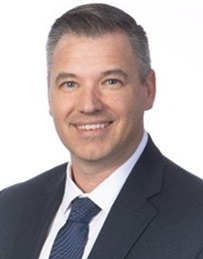
Session Chair: Prof. Waleed Khalil, Ohio State University
Abstract: Microelectronics are critical to all aspects of modern life and imperative for national security. As the technology and its producing sources grow more complex, the products and systems that consume microelectronics, and especially those with long-life applications, are at an increasing risk of cyber-physical vulnerabilities, IP theft, diminishing sources, counterfeit issues, and obsolescence. Developing a sustainable innovation ecosystem for trusted and assured semiconductor and microelectronic supply chains can be catalyzed with an emphasis on the first principles of innovation, focused by a “No-Excuse” roadmap. This talk will explore the challenges and opportunities in developing such an ecosystem, including the mechanisms to incentivize collaboration between academia, industry, and government across commercial and defense sectors to build market-differentiating products and resilient systems.
Biography: Dr. Matthew Casto is the Chief Technology Officer of The Midwest Microelectronics Consortium (MMEC), where he leads technological innovation and directs product research and development from the laboratory to commercialization. Dr. Casto holds B.S. and M.S. degrees in Electrical Engineering from Wright State University and a Ph.D. in Electrical and Computer Engineering from The Ohio State University. He joined MMEC in 2023 after serving over 20 years in various technical leadership roles within the Department of Defense (DoD), including as Director of the DoD Trusted and Assured Microelectronics (T&AM) Program and Senior Strategic Advisor for Microelectronics Innovation at the U.S. Air Force. Dr. Casto also led sensor and countermeasure technology development for airmen and guardians at the Air Force Research Laboratory and most recently led the delivery of high-volume smart, secure access control products as CTO and SVP of Engineering and Manufacturing at the Genie Company. He has authored over 50 publications, patents, and invited talks and was inducted into the IEEE Hardware Oriented Security and Trust (HOST) Hall of Fame in 2020. He is also a 2025 recipient of the Presidential Early Career Award for Scientists and Engineers (PECASE).

Session Chair: Mr. Dominic Mohrhardt (AFLCMC)
Abstract: Our world faces significant challenges that also present remarkable opportunities for technological advancements. Semiconductors are crucial in addressing global needs in energy, healthcare, automotive technologies, and communications. This keynote explores how innovations in semiconductor technology, such as advanced model architectures and system partitioning, can drive sustainable growth and energy efficiency. The need for co-optimization across the system stack—while maintaining rigorous security standards—is essential to ensure both performance and resilience. The National Semiconductor Technology Center (NSTC) will play a vital role in fostering collaboration and ensuring that the U.S. remains a leader in technological innovation.
Biography: Mr. Salman Nasir is the Director of the Program Management Office at Natcast, overseeing R&D programs. Previously, he was the Programs & Site Lead at Battelle's Dayton facility, managing Microelectronics Security Research and Hardware Assurance programs. He has over a decade of R&D experience, particularly in microelectronic hardware, RF communication, EO/IR sensors, high-performance computing, image processing, and compound semiconductor devices. Mr. Nasir holds an MBA, an MS in Electrical Engineering, and a BS in Electrical Engineering. He is a certified PMP® and Six Sigma Black Belt, with multiple industry and DoD awards, including the Defense Manufacturing Technology Achievement Award.

Session Chair: Mr. Aaron Miller, Galois, Inc.
Abstract: Mr. P. Len Orlando III will discuss the critical role of side-channel analysis in securing microelectronics, especially in the Federal, Aerospace, and Defense sectors. Drawing from his extensive experience at the Air Force Research Laboratory and Ansys, he will examine how side-channel vulnerabilities affect the security and trust of semiconductor systems. The session will explore Ansys’ efforts to develop advanced tools for side-channel analysis, leveraging Electronic Design Automation (EDA) technologies and scalable cloud solutions to enhance hardware security. Mr. Orlando will provide insights into cutting-edge research aimed at protecting hardware from side-channel attacks, highlighting the technical advancements and practical applications in the semiconductor field.
Biography: Mr. P. Len Orlando III is a Senior Business Development Executive at Ansys, within the Ansys Government Initiatives (AGI) business unit. He joined Ansys in January 2023 to lead semiconductor efforts focused on the Federal, Aerospace, and Defense marketplace. Prior to joining Ansys, Mr. Orlando served 21 years as a Senior Scientist at the Air Force Research Laboratory, Sensors Directorate. He holds a B.S. degree in Electrical and Computer Engineering from The Ohio State University and an M.S. degree in Electrical Engineering from the University of Dayton. His career spans several diverse areas, including trust and assurance, RF MMIC and AMS design, EDA infrastructure, and scalable cloud deployment.

Abstract: This talk explores advances in AI and trusted microelectronics security for protecting critical infrastructure. Dr. Kenneth M. Hopkinson will highlight the role of cognitive radios, sensor fusion, and remote sensing technologies in securing essential critical systems like AF, military communication networks, and power grids. The discussion will cover emerging cryptographic protocols and the integration of security solutions into assured and trusted systems and aerospace applications.
Biography: Dr. Kenneth M. Hopkinson is a Professor of Computer Science and Department Head of Electrical and Computer Engineering at the Air Force Institute of Technology (AFIT) in Dayton, Ohio. He is a Senior Member of the IEEE and ACM professional societies. Proficient in Networking, Security, Cryptography, Remote Sensing, Sensor Fusion, Critical Infrastructure Protection, and Space Applications, he has made significant research contributions that enhance national security and technological advancements.

Abstract: Innovation vs Security: The Perpetual Tug-of-War. The last few decades have exemplified the continuous struggle between fostering and sustaining innovation while ensuring secure deployment and runtime. Security has often been seen as being diametrically opposed to convenience. Let’s face it, how often do we see an Instagram reel or social media post about how wicked-cool or ingenious some new piece of technology is versus posts about how secure that technology is? And when we do see those posts about security, it is typically from the creator of the technology and not by its users. Recognizing the world of electronics is at an inflection point with the advances of artificial intelligence and post-quantum computing, it is imperative that we overcome this perceived conflict between innovation and security at a time when our cyberinfrastructure is under its greatest threat in history. If we fail, our critical infrastructure won’t be far behind.
Biography: Dr. Matthew Areno is the CEO and co-owner of Rickert-Areno Engineering and Consulting. Dr. Areno completed his Bachelor’s and Master’s degrees at Utah State University in 2007 and took a position with Sandia National Laboratories. At Sandia, he focused on vulnerability assessment and reverse engineering of embedded systems primarily utilizing ARM-core processors. During this time, he also completed his PhD at the University of New Mexico with dissertation work on strengthening embedded system security through the use of PUF-enhanced cryptographic units. In 2013, Dr. Areno took a position with Raytheon Cyber Security Innovations in Austin, TX; he served as a Chief Architect for a number of anti-tamper solutions, with specific expertise in establishing trust in COTS equipment. In 2019, he joined Intel where he served as a Senior Principal Engineer and had roles including the Senior Director of Security Assurance and Cryptography, Chief Security Architect, and Anti-Tamper Lead. Dr. Areno serves on the Board of Advisors for Augusta University School of Computer and Cyber Sciences, as the co-chair of the Secure Edge Working Group under the Midwest ME-Commons Consortium, and on the Editorial Board for the Journal of Hardware and Systems Security.

Session Chair: Dr. Love Kumar Sah (Western New England University)
Abstract: Smart cities use one or multiple smart systems (or components) including smart healthcare, smart agriculture, and smart energy, and hence is a system of systems. The various systems of the smart cities are essentially cyber-physical systems (CPS) made of 3Cs (Computation, Communications, and Control). While connectivity is the key for IoT-enabled CPS, it brings in various forms of cyber-attacks on its devices, systems, and data. The existing cybersecurity solutions have serious resources, energy and latency overheads making them impossible for use in CPScomponents like medical devices, smart cars, and UAVs. Blockchain based solutions is being explored in almost every application in smart cities. However, blockchains have significant energy, latency, and scalability issues and not suitable for resource constrained frameworks. This talk will present broad perspectives of the vast multifaceted forms of cybersecurity attacks and secure/security by design (SbD) solutions in CPS. SbD advocate making cybersecurity as a requirement right in the design phase so that retrofitting would not be needed. The talk will present SbD driven cybersecurity solutions for CPS or IoT usingthe hardware security primitive Physical Unclonable Function (PUF). The talk will address many questions about SbD including: (1) What are the challenges of cybersecurity? (2) What is SbD?(3) What are the 7 principles of SbD? (4) What is Hardware-Assisted Security (HAS)? (5) How SbD can be used for IoT/CPS? (6) What are specific examples SbD deployment in CPS?
Biography: Dr. Saraju Mohanty is a Professor at the University of North Texas. Prof. Mohanty’s research is in “Smart Electronic Systems” which has been funded by NSF, SRC, US Air Force, IUSSTF, and Mission Innovation. He has over 20 years of research experience on security and protection of media, hardware, and systems. He introduced the Secure Digital Camera (SDC) in 2004 with built-in security features designed using HardwareAssisted Security (HAS) or Security by Design (SbD) principle. He is widely credited as the designer for the first digital watermarking chip in 2004 and first the low-power digital watermarking chip in 2006. He has authored 550 research articles, 5 books, and 10granted and pending patents. His Google Scholar h-index is 59 and i10-index is 282 with 16,000 citations. He is a recipient of 21 best paper awards, Fulbright Specialist Award in 2021, IEEE Consumer Electronics Society Outstanding Service Award in 2020, and the PROSE Award for Best Textbook in Physical Sciences and Mathematics category in 2016. He has delivered 31 keynotes and served on 15 panels at various International Conferences. He has been serving on the editorial board of several peer-reviewed international journals, including IEEE Transactions on Bigdata, IEEE Transactions on CAD as well as EiC of IEEE Consumer Electronics Magazine. He is the steering committee chair/vice-chair for the IEEE International Symposium on Smart Electronic Systems (iSES), the IEEE-CS Symposium on VLSI (ISVLSI), and the OITS International Conference on Information Technology (OCIT). He has supervised 3 post-doctoral researchers, 17 Ph.D. dissertations, 28 M.S. theses, and 41 undergraduate-research projects.
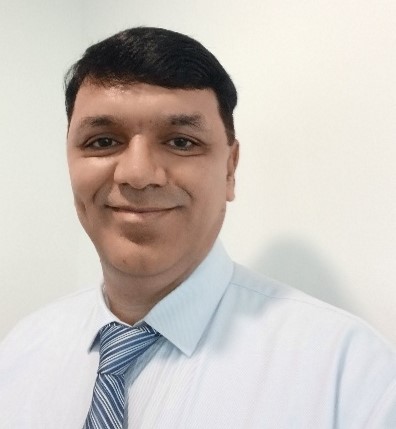
Session Chair: Dr. Love Kumar Sah (Western New England University)
Abstract: This talk explores the integration of Artificial Intelligence (AI) and Cybersecurity in securing microelectronics, with a focus on the emerging challenges in IoT and edge computing systems. It will cover innovative AI-driven solutions for enhancing the security, resilience, and trustworthiness of microelectronic systems and supply chains. The discussion will also address the role of AI in identifying and mitigating evolving threats, and the significance of interdisciplinary collaboration in strengthening digital infrastructures. Key global research trends and the transformative potential of these technologies in ensuring secure and trusted systems will also be highlighted.
Biography: Prof. Dr. Noor Zaman Jhanjhi is a highly esteemed Senior Professor of Computer Science, specializing in Artificial Intelligence and Cybersecurity. He currently holds the position of Professor at the School of Computer Science at Taylor’s University, Malaysia, and serves as the Program Director for Postgraduate Research Degree Programmes as well as the Director of Research Center. With a career marked by academic leadership and groundbreaking research, Prof. Jhanjhi has been pivotal in advancing research and education in computer science. Recognized globally, Prof. Jhanjhi has been ranked among the world’s top 2% research scientists for three consecutive years (2022, 2023, and 2024). In Malaysia, he is ranked among the top three computer science researchers and was honored with the Outstanding Faculty Member award by MDEC Malaysia in 2022, as well as the Vice Chancellor’s Best Research Citations Award from Taylor’s University in 2023. His impressive academic portfolio includes over 70 research books edited or authored with prestigious publishers such as Springer, Elsevier, Taylor & Francis, Wiley, and IGI Global USA. His research has garnered more than 1000 points in impact factor, reflecting the depth and breadth of his contributions to the field. A dedicated mentor, Prof. Jhanjhi has supervised and co-supervised 38 postgraduate students to successful graduation and has served as an external examiner for over 60 Ph.D. and Master’s theses globally. In addition to his academic accomplishments, Prof. Jhanjhi holds Associate Editor and Editorial Board positions with several high-ranking journals, including PeerJ Computer Science, CMC Computers, Materials & Continua, and Frontiers in Communication and Networks. He was also recognized as an Outstanding Associate Editor for IEEE ACCESS. His contributions to research and innovation are further demonstrated by his successful management of over 40 internationally funded research grants.
A sought-after keynote speaker, Prof. Jhanjhi has delivered over 70 invited talks at international conferences and has chaired numerous sessions. His commitment to academic excellence and accreditation extends to his involvement with ABET, NCAAA, and NCEAC over the past decade.
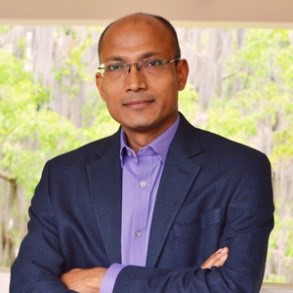
Session Chair: Prof. Moussa Ayyash, Chicago State University
Abstract: With the emergence of the Internet of Things (IoT) regime that promises exciting new applications from smart cities to connected autonomous vehicles, security of edge devices has come to the forefront of the system design process. Recent discoveries and reports on numerous security attacks on microchips and circuits violate the well-regarded concept of hardware trust anchors. This talk will cover a spectrum of challenges associated with hardware security and describe emerging solutions in creating secure trustworthy hardware that can enable IoT security for the mass.
Biography: Dr. Swarup Bhunia is currently a preeminence professor of cybersecurity and Semmoto Endowed Professor of IoT at the University of Florida. He has authored 10 books, over 300 publications, and received multiple awards, including the IEEE HOST Hall of Fame. His research spans hardware security, adaptive nanocomputing, and test methodologies.
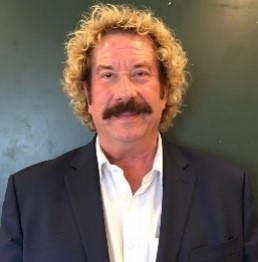
Session Chair: Prof. Moussa Ayyash, Chicago State University
Abstract: In his keynote, Dr. Harbour will discuss the emerging field of neuromorphic engineering and its role in shaping the future of AI hardware. He will explore how neuromorphic systems—designed to replicate the neural networks of the human brain—are pushing the boundaries of AI, offering novel solutions to current challenges in speed, energy consumption, and scalability. With insights into the latest research and practical applications, attendees will gain a deeper understanding of how AI hardware can evolve to support more efficient, adaptive, and robust AI technologies.
Biography: Dr. Harbour is a recognized leader in AI hardware research and currently serves as the Director at the Center of Excellence for Parallax Advanced Research. His expertise lies in neuromorphic engineering, focusing on developing advanced hardware systems inspired by the human brain for more efficient AI computations. With a solid background in AI, machine learning, and hardware integration, Dr. Harbour is advancing technologies to improve performance and energy efficiency in AI applications. He is also an active Senior Member of IEEE, making significant contributions to both academia and industry through research, innovation, and leadership in AI hardware.

Session Chair: Mr. Eric Parsley, Expedient Technology Solutions, LLC
Abstract: Machine Learning (ML) and Artificial Intelligence (AI) have become transformative forces shaping society, from business and academia to IoT devices. However, AI failures demand urgent forensic attention. This keynote explores AI forensics, an emerging sub-discipline of digital forensics, addressing the need for forensic methodologies to investigate AI-related incidents.
Biography: Dr. Baggili is a renowned digital forensics and cybersecurity researcher, having won multiple awards, including the Medal of Thor from the Military Cyber Professional Association. He has led over $14M in funded research and is a TEDx speaker. His work has impacted over a billion people worldwide.

Session Chair: Mr. Dominic Mohrhardt, AFLCMC
Abstract: With increased development in autonomous vehicles, smart mobility solutions, and IoT integration, cybersecurity is crucial. Dr. Tout will discuss challenges and solutions in mobility and autonomy cybersecurity, emphasizing AI-driven anomaly detection, predictive analytics, and secure system design.
Biography: Dr. Tout is a cybersecurity expert and professor at Eastern Michigan University. He has led NSF-funded projects on cybersecurity and anomaly detection. He has served as a consultant for industry leaders and is a TEDx speaker.

Session Chair: Mr. Dominic Mohrhardt, AFLCMC
Abstract: The increasing complexity of secure ASIC and accelerator design demands a shift toward digital-first, component-oriented engineering methodologies. Aaron Miller will explore security assumptions, formal methods, and co-design strategies for resilient and efficient semiconductor architectures.
Biography: Aaron Miller is a leader in secure systems at Galois. He co-founded two startups focused on secure engineering and silicon design. His expertise bridges research, industry, and government to advance trustworthiness in semiconductor development.

Session Chair: Dr. Matthew Casto, CTO, MMC
Abstract: The Department of Defense's (DoD) Microelectronics Commons, a $2 billion initiative under the CHIPS and Science Act, is transforming domestic semiconductor innovation and production. Stephanie Lin will highlight key advancements in microelectronics security, policy considerations, and the role of public-private partnerships in strengthening the U.S. semiconductor ecosystem.
Biography: Stephanie serves as the Vice President at NSTXL overseeing the execution of the Microelectronics Commons. She has extensive experience in hardware assurance, anti-tamper technologies, and microelectronics policy, previously supporting senior leaders within the Office of the Secretary of Defense.

Abstract: Dr. Wayne Churaman will provide a comprehensive overview of the evolving landscape of secure microelectronics and IoT. This session will emphasize the importance of building a skilled workforce, fostering R&D in secure electronics, and addressing future challenges in semiconductor security.
Biography: Dr. Churaman is the Technical Execution Area Lead for Secure Edge/IoT at the Army Research Laboratory. He has published over 24 journal papers and has significant contributions in microelectronics security.

Abstract: Dr. Gawron-Hyla will explore the strategic importance of workforce development in secure and trusted microelectronics, highlighting key initiatives, industry-government partnerships, and innovative training programs.
Biography: Dr. Gawron-Hyla leads workforce development efforts for the Microelectronics Commons. She has a strong background in chemistry and education, previously serving as a high school science department chair.

Session Chair: Mr. Kirk Herath, Cybersecurity Advisor to Ohio Governor
Abstract: Mr. Duffey will discuss workforce development in microelectronics, semiconductors, IoT, cybersecurity, and assured systems. He will explore funding opportunities for R&D, emphasizing collaboration between academia and industry.
Biography: Appointed as Ohio’s 11th Chancellor in January 2024, Mr. Duffey oversees higher education institutions in the state. He was previously a Senior Vice Chancellor and a state legislator. He holds an MBA from The Ohio State University.

Session Chair: Mr. Dominic Mohrhardt, AFLCMC
Abstract: Dr. Abel will explore cybersecurity failures and the need for radical stewardship. He will discuss his work on the Dauug | 36 minicomputer as a novel security-conscious architecture.
Biography: Dr. Abel is an engineer-scientist with expertise in security-centric computer architectures. He holds degrees from Caltech and Wright State University.

Session Chair: Dr. Suleiman Ashur, Eastern Michigan University
Abstract: Dr. Alarcon will discuss trust in AI/ML, emphasizing human factors, personality influences, and how trust is formed or eroded in AI-driven technologies.
Biography: A senior research psychologist at AFRL, Dr. Alarcon specializes in human-AI interactions. He earned his PhD in industrial-organizational psychology from Wright State University.

Session Chair: Mr. Eric Parsley, Expedient Technology Solutions, LLC
Abstract: Mr. Boian will provide insights into cybersecurity leadership, risk management, and adapting to emerging threats. He will discuss public-private collaborations in shaping national cybersecurity policies.
Biography: A former NSA executive, Mr. Boian has held senior roles in both government and private sectors. He serves on cybersecurity advisory boards and holds multiple prestigious awards in national security.

Session Chair: Dr. Suleiman Ashur, Eastern Michigan University
Abstract: This talk will highlight cybersecurity workforce training, leadership, and innovation. Ms. Reynolds will discuss industry trends and skills development strategies.
Biography: Ms. Reynolds is an award-winning cybersecurity professional and CEO of ReynCon. She has worked in cybersecurity for 19+ years and mentors aspiring security professionals.
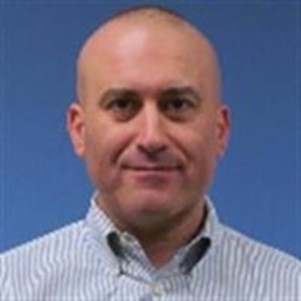
Session Chair: Mr. Dominic Mohrhardt, AFLCMC
Abstract: This talk focuses on cybersecurity education and workforce readiness. Mr. Salahieh will discuss Capture the Flag (CTF) competitions and industry-aligned cybersecurity training.
Biography: Mr. Salahieh is a cybersecurity professor and program chair at Ivy Tech Community College. He has received multiple teaching excellence awards and specializes in cybersecurity education.